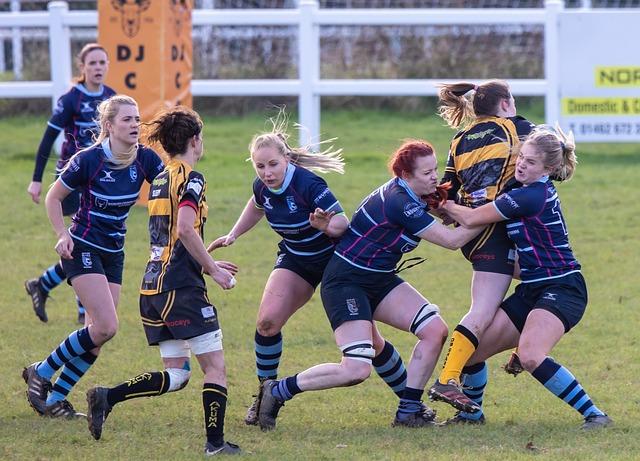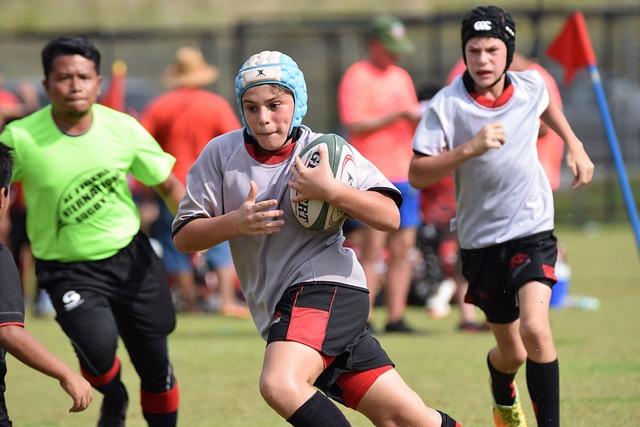In the lead-up to the highly anticipated Six Nations tournament, georgia’s head coach Richard Cockerill has expressed a bold ambition for his team: a desire to secure a play-off spot against Wales. With the competition promising to showcase the best of European rugby, Cockerill’s aspirations not only highlight Georgia’s growing prowess in the sport but also raise questions about the evolving dynamics within the tournament. As the conventional powerhouses contend for supremacy, Georgia aims to make a statement, and Cockerill’s vision could signify a turning point for the nation’s rugby ambitions. In this article, we explore Cockerill’s strategic outlook, the implications of his statements, and what it would mean for both Georgia and Wales should this dream playoff materialize.
Georgias Ambitious Bid for Six Nations Inclusion Through Play-off with Wales
Georgia’s national rugby union team is generating significant buzz with its proposal for a play-off against Wales, aiming for inclusion in the Six Nations tournament. Under the guidance of coach Richard Cockerill, georgia is resolute to showcase their growth and skill level, advocating for a more inclusive competition that allows emerging rugby nations a chance to compete at the highest level. Cockerill’s vision is not just about today’s game but a commitment to the long-term ambition of elevating Georgian rugby on the international stage.
Recognizing the historical importance of the Six Nations, Georgia is hopeful that a play-off might not only enrich the tournament’s tapestry but also foster increased competition. As rugby evolves, the inclusion of teams like Georgia would be a testament to the sport’s global growth. Key points supporting their case include:
- Recent Performance: Georgia’s notable showing in the Rugby Europe Championship.
- Player Development: A steady influx of talent making their mark in European leagues.
- Fan Engagement: Growing support from fans both domestically and internationally.

Richard Cockerills Strategic Vision for Georgian Rugby in International Tournaments
Richard Cockerill’s strategic vision for elevating Georgian rugby focuses on a robust framework for competing in international tournaments. Central to this approach is the development of a high-performance training regimen designed to enhance player fitness and skills. This pursuit involves the incorporation of advanced analytics to identify and nurture emerging talent while ensuring that established players remain at peak performance. Cockerill is placing significant emphasis on building a cohesive team surroundings that fosters collaboration both on and off the field.Key components of his strategy include:
- Enhanced player scouting and development programs
- Implementing a hands-on coaching beliefs that emphasizes adaptability in match situations
- Strengthening the support network for players, including mental health and nutritional resources
Moreover, Cockerill is committed to enhancing Georgia’s competitive presence in prestigious tournaments such as the Six Nations. He believes that strategic matches against higher-ranked teams could provide invaluable experiance, helping the team to refine their tactics and resilience. Cockerill advocates for strategic partnerships with other rugby nations, aimed at facilitating knowledge exchange and staging joint training camps. Grounded in these principles, his vision includes measurable objectives, such as:
| Objective | Timeline |
|---|---|
| Increase player participation in top-tier leagues | By 2025 |
| Attain a top 10 ranking in world rugby | By 2027 |
| Achieve consistent qualification for major tournaments | Annual reviews |

Assessing the current Landscape of the Six Nations and Georgias Role
The Six Nations Championship continues to evolve, as traditional powerhouses face new challenges from emerging teams. Georgia’s ascent in european rugby has not gone unnoticed, and the recent comments from their head coach, Richard Cockerill, illustrate a growing ambition within the team. As Georgia prepares for upcoming fixtures, their commitment to compete at the highest level is underscored by recent performances and strategic developments. The team’s efforts to secure a spot in a potential play-off against Wales highlight their desire to not only consolidate their place among the elite but also to redefine expectations for tier-two nations.
Moreover, the landscape of European rugby is shifting, with Georgia poised to play a pivotal role in future tournaments. as they continue to refine their gameplay and unleash their talent on the international stage, key factors include:
- Strong Youth Development: georgia has invested in youth programs that cultivate raw talent into skilled athletes.
- Increased International Tests: More frequent matches against top-tier teams amplify their experience and competitiveness.
- Strategic Partnerships: collaborations with established rugby nations enhance tactical understanding and exposure.
Georgia’s strong performance in recent european competitions,coupled with strategic coaching,positions them as formidable contenders. Their ambitions to challenge Wales in a future play-off reflect not just confidence but a commitment to growth, aiming to disrupt the established order of rugby in the Six Nations.

Key Factors Influencing Georgias Success in securing a Play-off Opportunity
Georgia’s quest for playoff contention in the Six nations is underpinned by several crucial elements that have galvanized their performance on the field. First and foremost, team cohesion has emerged as a significant advantage. The players, many of whom have a deep understanding of each other’s playing styles due to long-standing club connections, display an almost seamless on-field synergy. Additionally, coaching strategies implemented by richard Cockerill have emphasized a robust defensive setup coupled with aggressive forward play, which has paid dividends in high-pressure situations that are ofen pivotal during tournament matches.
Moreover, the rise of key individuals in the squad has further contributed to Georgia’s success. Players such as captain Mamuka Gorgodze and emerging talents exhibit not only technical skills but also exemplary leadership qualities that inspire the team. Moreover, the strategic harnessing of the home advantage, notably during games held at their passionate fan-filled venues, has been critical in enhancing team morale and performance. The combination of these factors positions Georgia as a formidable contender, making them a serious threat to any opponent, particularly as they eye the potential of a playoff berth.

Potential Implications of a Georgia-Wales Play-off for European Rugby Dynamics
The prospect of a play-off between Georgia and Wales could considerably reshape the landscape of european rugby, especially within elite competitions. Should Georgia secure a match against Wales, it would not only serve as a test of their growing prowess but also underscore the changing dynamics of rugby union in Europe. The potential for an upset could lead to a realignment of power within the Six Nations and beyond, showcasing how the tier-two teams are increasingly challenging the traditional hierarchies of the sport. Factors contributing to this shift may include:
- Improved Development Programs: Georgia’s commitment to nurturing talent has led to a more competitive side.
- Recent Performances: Their ability to hold their own against established teams proves they belong at higher levels.
- Fan Engagement: Increased support for Georgia could lead to more commercial opportunities and investment.
A match of such caliber would also ignite discussions about format changes within the Six Nations, pushing for inclusivity and representation of emerging rugby nations. The repercussions could be felt in the broader context of European rugby, as the Azzurri and other competitive teams may seek reassurances about their status in tournaments. The implications for fixture scheduling, sponsorship deals, and global audiences might unfold as stakeholders reassess the value and equity of including teams based on competitive potency rather than tradition. Key considerations could include:
| Consideration | potential Impact |
|---|---|
| Changing Tournament Format | Greater competitiveness and fan engagement |
| Sponsorship opportunities | Influx of investment for emerging teams |
| Global Audience Reach | Expansion of viewership through diverse competitions |

Recommendations for Strengthening Georgia’s Rugby Infrastructure Ahead of the Play-off
to enhance Georgia’s rugby infrastructure in preparation for the pivotal play-off against Wales, a multifaceted approach is essential. Investment in grassroots programs must be prioritized to nurture young talent, ensuring that future generations of players are equipped with the skills needed at higher levels. Initiatives like community clinics and school partnerships can ignite interest in rugby, making it a sport of choice among children and teenagers. Additionally, boosting coaching standards through certified training programs will provide local coaches with advanced methodologies and techniques, fostering a learned coaching landscape that directly translates to better player performance.
Another significant aspect is the upgrading of facilities and training grounds, which would greatly benefit the national team and youth players alike. Modernizing existing venues and constructing new pitches with high-quality surfaces can create an environment conducive to high-performance training. furthermore, establishing stronger ties with international clubs can be instrumental in sharing knowledge and best practices. This could be facilitated through exchange programs, where Georgian players gain overseas experience while bringing back invaluable insights.These strategic enhancements will not only fortify Georgia’s immediate rugby capabilities but also contribute to a enduring and competitive rugby culture.

In Summary
Richard Cockerill’s aspirations for Georgia in the Six Nations spotlight not only the strategic ambitions of the national team but also underscore the broader conversation surrounding competitive inclusivity in rugby. By calling for a play-off with Wales, Cockerill is advocating for a testing ground where emerging rugby nations can challenge traditional powers, further enhancing the tournament’s appeal. As Georgia continues to develop its capabilities on the international stage, the ramifications of such a proposal could signal a shift in how rugby’s future tournaments are structured. With the potential for an exciting clash on the horizon, fans and stakeholders alike will be keenly watching how this bold vision unfolds. The coming months will be crucial for Georgia, and Cockerill’s vision may just pave the way for a thrilling new chapter in European rugby.
















